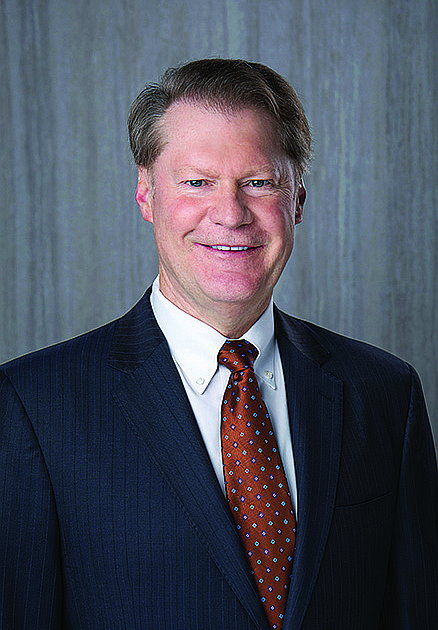
COEUR d’ALENE — A nationwide search for Kootenai Health’s next CEO is down to three.
“You will get a fantastic CEO,” said Jon Ness, the hospital’s 13-year CEO who announced his retirement earlier this year.
Interest in the position has been strong.
The initial announcement of the job opening and use of an executive recruiting firm resulted in 600 resumes. That was trimmed to 100, and then pared to 12. Six of those were interviewed in person, finally leaving three candidates.
All are extremely capable, Ness said to about 30 members of the Coeur d’Alene Sunrise Rotary Club in a recent presentation at The Coeur d’Alene Resort.
He said he was not surprised at the number of medical professionals who would like to lead Kootenai Health, an independent hospital with no corporate office that makes its own decisions.
“This is a wonderful professional position,” he said. “I am so grateful for having had the opportunity to work here. It’s just been an honor.”
Ness, who plans to leave the post in early 2024, said Kootenai Health is a unique hospital.
“I’m not sure it’s entirely understood how unique it actually is in the country,” he said.
In 2021, there were 6,090 hospitals in the country, and 47% of those were not-for-profit private corporations. Twenty-one percent were for profit and 27% were public hospitals like Kootenai Health. There are also veterans and Shriners hospitals.
Of the 27% that are public, only 22 have more than 300 patient beds. Kootenai Health, with 331 patient beds, is the only one that has taxing authority but doesn’t use it, Ness said.
Kootenai Health will be converting from a hospital district to a nonprofit at midnight Dec. 31, a move Ness said is necessary for several reasons.
He said as a public hospital, all of its board meetings are open to the public, which itself isn’t a problem. But health care has become more competitive and any of Kootenai Health’s competitors can attend or virtually join a board meeting.
He also said Kootenai Health is subject to open public records requests, meaning a competitor can ask for information and Kootenai Health must provide it.
Ness called that a “strategic disadvantage.”
In May, Kootenai Health’s board voted for the transition in status.
“I’m confident this is the right thing for Kootenai Health,” he said.
The board will no longer be elected, but appointed, with current board members serving out their terms.
“For patients, you will notice zero difference,” he said.
Ness also took a look at COVID-19’s impact, when the hospital lost about 1,000 employees to stress, fatigue and safety concerns.
The staff was some days treating COVID patients inside while people were protesting vaccine requirements outside.
“It was a difficult environment,” he said.
Because of the personnel shortage, Kootenai Health had to use national traveling nurse agencies, which were costly. Last year was the first year in its history, Kootenai Health lost money.
“And the reason we lost money was we spent $70 million on nurse traveler arrangements,” he said.
But the situation has improved.
Kootenai Health has hired about 940 new employees this year
“And they all look young to me,” Ness said, smiling.
The hiring process has been automated to make it faster and simpler. Kootenai Health also adjusted its compensation rates for clinical staff to a benchmark using Spokane wages instead of Idaho.
“That has really helped because Idaho wages for healthcare have not been competitive,” Ness said. “So we increased our rates and that’s made a big difference in terms of hiring.”
Kootenai Health generally employs about 4,000 people.
“I think we can say that we’re almost back to our normal operation,” he said.
Ness said Kootenai Health recruits physicians from across the country, competing with nationally known medical centers.
KH generally adds about 25 to 35 new doctors each year. This year’s hirings include four cardiologists, two neurologists, an obstetrician, three internists, two orthopedic surgeons, a neurosurgeon, and vascular surgeon.
“This is a very attractive place to work,” he said.
About 2,200 babies will be delivered at Kootenai Health this year, and that number is expected to increase about 10% next year.
It also completed a major expansion of the heart center.
“It’s exciting to be in a growing community but it’s not so easy to keep pace,” Ness said.
The growth has led to a rise in more people needing help in a hurry.
This year, Kootenai Health will have between 55,000 to 60,000 visits to the emergency department. A slow day is 130 patients, and a busy one, about 180.
Ness said injuries related to pickleball, popular with seniors, and electric bikes, which go faster and stop quicker than people realize, are among new trends in the emergency department visits.
“Word of caution, pickleball, eBikes, be careful out there,” Ness said, as the crowd laughed.
In the last 43 years, Kootenai Health has had two CEOs: Joe Morris, from 1981 to 2011, and Ness. The average venture of a hospital CEO is five years.
“We have a lot of continuity and stability in the organization,” Ness said. .
